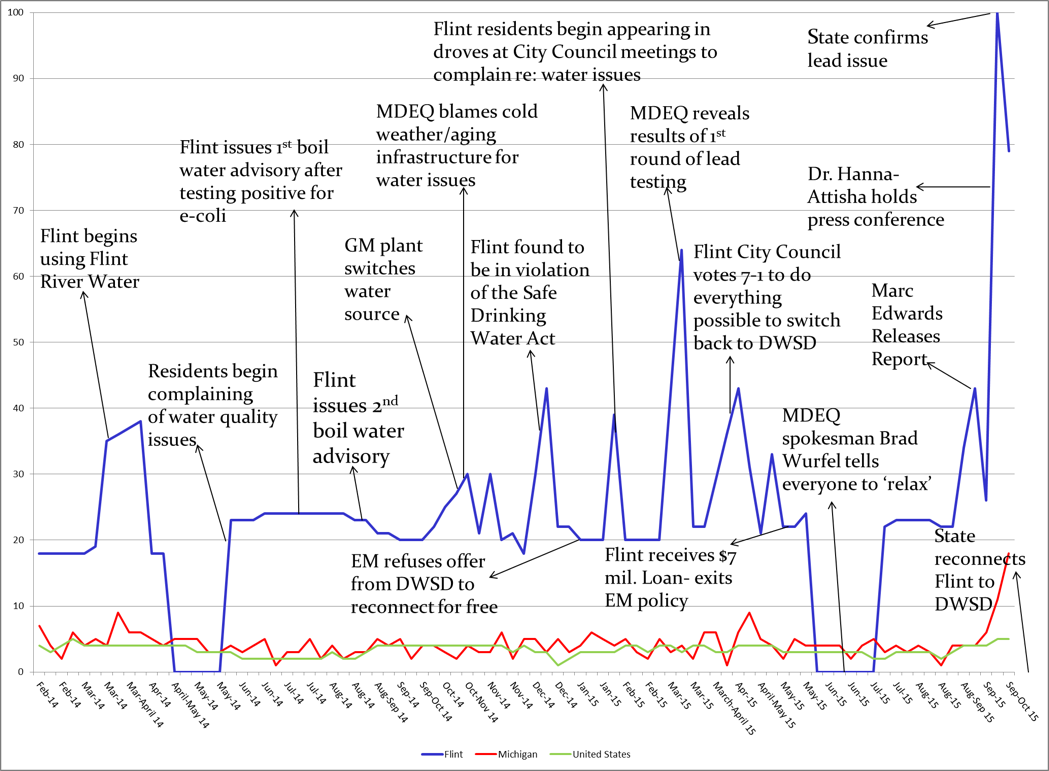Google trends, an application tied to Google search engine, shows the volume of particular search terms relative to the total search volume across geographic areas. It can show a user what search terms are tending near them at any particular moment, and also show search history for past events. While this is great for hindsight, is it possible to use Google trends as a policy tool as an indicator for local interest in particular issues?
Researchers with the Center for Disease Control used Google trends to predict where influenza was occurring. They sought to improve early detection of influenza breakouts by “monitor health-seeking behaviour in the form of queries to online search engines”, and they found that google searches for flu-related terms were highly correlated with doctor visits within geographic regions. Yet other researchers found that Google searches were often ineffective at pinpointing flu outbreaks and regularly overshot.
Other researchers found that countries with higher GDPs were much more likely to search about potential future events when compared to lower GDP countries who searched much more for historical events. Some of the same researchers found that Google searches for financial terms tend to be predictive of large stock market losses. Google trends thus can offer useful data.
But can Google trends be used as an effective policy tool? In Flint, Michigan, citizens were subjected to extremely high levels of lead in their water source for several years. The water crisis was exacerbated by the lack of response from Michigan’s Emergency Managers, state-appointed officials who take power from local elected officials in order to return cities to financial solvency.
The graph below shows Google trends from the search term “lead water” within the city’s geographic region when compared to the State of Michigan, and the United States as a whole.

It shows that residents started searching for ‘lead water’ almost as soon as the City of Flint switched its water source. Further, we can see that residents continued to search for lead water long before any elected official or emergency manager seemed to realize there was an issue. Interestingly, one of the major peaks, in March of 2015, is when the Michigan Department of Environmental Quality (MDEQ) revealed their results from the first round of lead testing, which indicated that lead levels were extremely low. One would expect this to appease the city residents, and perhaps lead to a drop in Google searches for lead water; however, we can see that is clearly not the case.
Also of note is the marked decrease in Google searches for lead water during the time period from June of 2015 to July of 2015 when the MDEQ was doing everything in their power to convince the media and local residents that the water was fine. The MDEQ spokesperson even went so far as to tell everyone to “relax” during this time, which Google searches indicate they may have taken to heart.
We can see the final dramatic spike in Google searches at the end of the process, when Marc Edwards from Virginia Tech released findings regarding the elevated lead levels in the water, and Dr. Mona Hanna-Attisha held a press conference to make public the elevated lead blood levels in children. It was only after these two came forward, and Google searches reached a new high, that the State of Michigan acknowledged resident’s complaints, and admitted that the lead levels were extremely high.
One of the most interesting stories from this particular case is the lack of response to citizen outcry. Citizens were concerned about lead levels for years before the State of Michigan, or local elected officials of Flint, acted.
In this case, Google trends proved to be an underlying indicator of something that was very amiss. It is very possible that Google trends, and the wisdom of the crowd that it indicates, could prove helpful to policymakers in other areas. Often, large crowds make better estimates than a single person, and Google trends is capable of harnessing what large crowds are searching for. It would behoove any local legislator to know what is ‘trending’ around their legislative area at any particular moment, in the case of Flint, it may have alerted authorities to the threat of lead poisoning.



